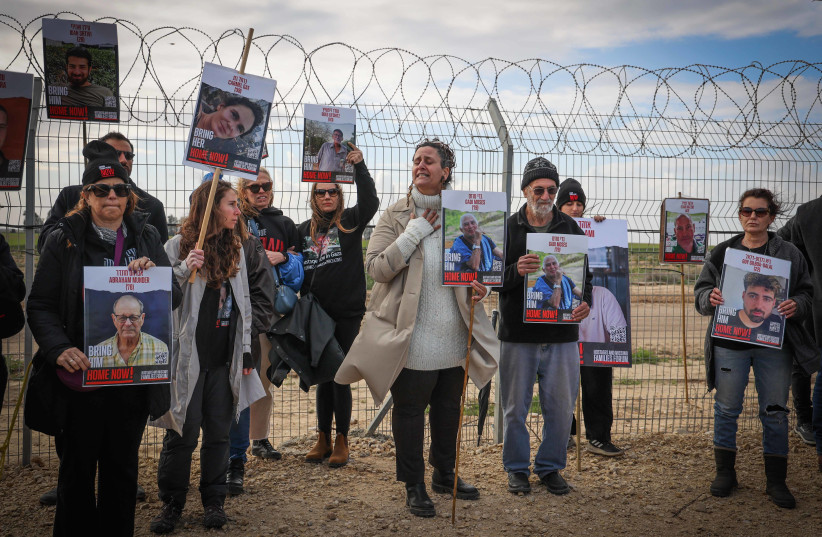I was recently in the US on one of my frequent trips to visit Christian communities and media outlets to speak about the war. I spent the weekend with friends in a large Jewish community. Almost every Jew I encountered was in a state of shock and anger over the events of October 7. The Jews I met over Shabbat, all from the Orthodox community, were steadfast in their resolve that Israel must destroy Hamas or risk a defeat that would undermine our national security for years to come.
I had one conversation that I will never forget. I was talking with a woman whose son had recently served in a combat unit in the Israeli army. She was saying that even though her son was trained as a combat soldier, she doesn’t want him going back to Israel to serve in a fighting unit in this war. While I understand the sentiment, I gently pushed back, reminding her that I had three of my own children and a son-in-law who were serving in combat units in and around Gaza at the time. But then she said something that stunned me.
“Look,” she said. “I’m a mother. No country is worth my son’s life.”
“I don’t know,” I replied. “If you told me that all my kids would survive the war but Israel would lose, that’s not a trade I’m willing to accept.”
I thought about this conversation the other day as I read the daily headlines here in Israel. A family member of one of the hostages currently being held by Hamas was quoted as saying that Israel may need to make some serious compromises to bring back the hostages. The context was the reported deal brokered by Egypt and Qatar to secure the release of all the hostages in exchange for an end to the war. This representative of the hostage families went on to criticize Prime Minister Benjamin Netanyahu for not accepting the deal.
Hostage families continue to pressure PM to accept hostage deals
According to Jewish law, the freeing of captives is the greatest act one can perform, the mitzvah that takes priority over all others. And yet, Jewish law also prohibits the redemption of captives for “more than their value.” The Talmud explains that the reason for not overpaying for captives is to not encourage the enemy to take additional captives in the future.
In other words, even though no more noble and necessary act takes precedence over the redemption of captives, we are prohibited from redeeming them if it means that danger to the Jewish community will be exacerbated as a result.
In the early days after October 7, Israel’s leadership made it very clear that the objective of this war was the destruction of Hamas, full stop. It was only as a result of pressure from many of the hostage families that the rescuing of the hostages was added as a second “primary” objective. And this has been the messaging of the IDF spokesman’s office and the government ever since.

Let's be clear. There is no such thing as having two “primary” objectives. It should be obvious that if there are two distinct objectives, only one can be “primary.” More to the point of our current crisis, what happens when the two objectives come into conflict?
There cannot be two primary objectives in war
As of this writing, 556 IDF soldiers have lost their lives since October 7. These soldiers gave their lives to secure victory over a genocidal enemy that poses an existential threat to the nation of Israel. If that objective is not achieved due to compromises made to save the hostages, Hamas will declare victory. And they will be right to do so. Stopping short of destroying Hamas to save the hostages would confirm the Hamas strategy. It would tell Israel’s enemies that taking hostages works, that it’s the path to Israel’s defeat. This is exactly what the Talmud warned against.
When Abraham passed God’s test and willingly offered up his son Isaac on the altar, Abraham received a blessing from God.
“By Myself I have sworn, says the Lord, because you have done this thing, and have not withheld your son, your only son, I will surely bless you and surely multiply your descendants as the stars of the heaven and as the sand on the seashore; and your descendants shall possess the gate of their enemies. And through your offspring all the nations of the earth shall be blessed, because you have obeyed My voice.” (Genesis 22:16-18)
The blessing has three components. The first and third, the blessings of abundant offspring and that all nations will be blessed through Abraham’s seed, were already told to Abraham previously (Gen 12:3, 15:5). The only new blessing Abraham received as a result of obediently offering up his son’s life to God is that his “descendants shall possess the gate of their enemies.” In other words, the lesson of the Binding of Isaac is that to win wars, we must be willing to put our children’s lives on the line.
The hostage situation is horrific. The danger and suffering they are enduring are terrible. The anguish of their families is an unimaginable nightmare. I, like every other Israeli and supporter of Israel, pray daily and yearn for the return of every hostage in health and safety. But I believe that I speak for many Israelis who are uncomfortable speaking the words that so many of us are thinking.
To paraphrase my reply to my friend in the US, let me pose a question. If all the hostages could be saved, but it would mean that Hamas would not be defeated, is that a trade you’d be willing to accept?
The writer is director of Israe365action.com and cohost of the Shoulder to Shoulder podcast.
